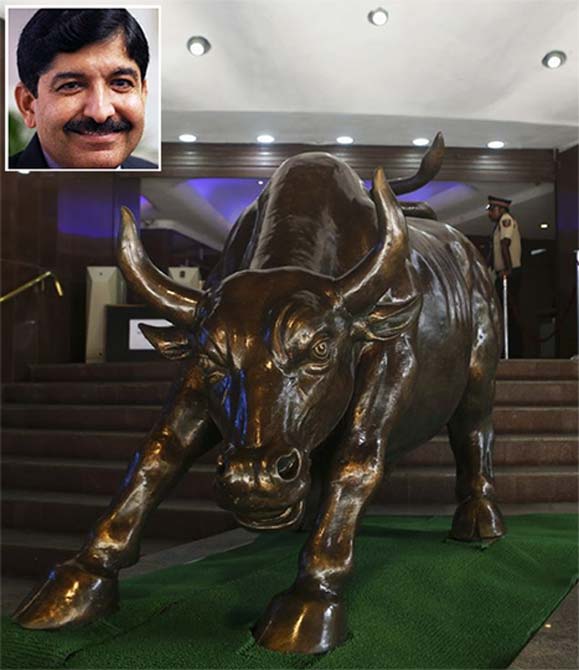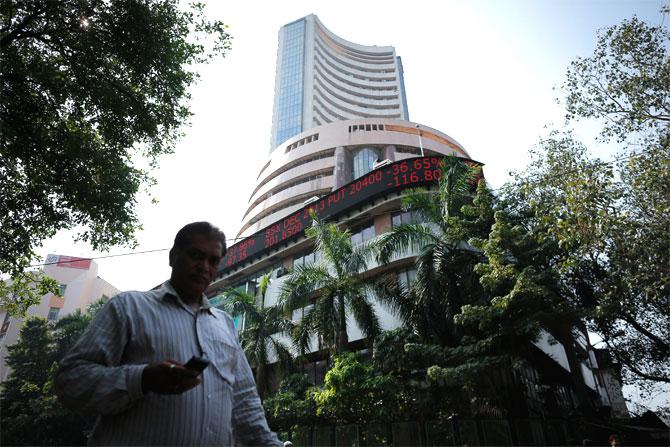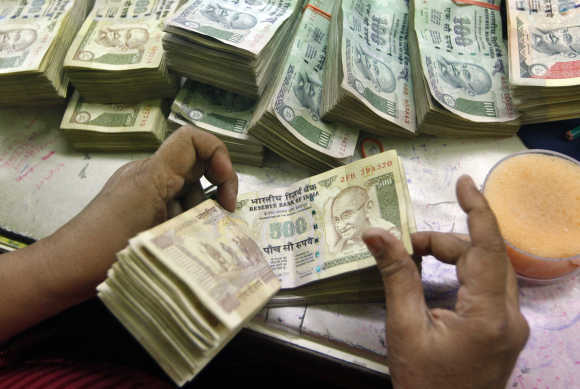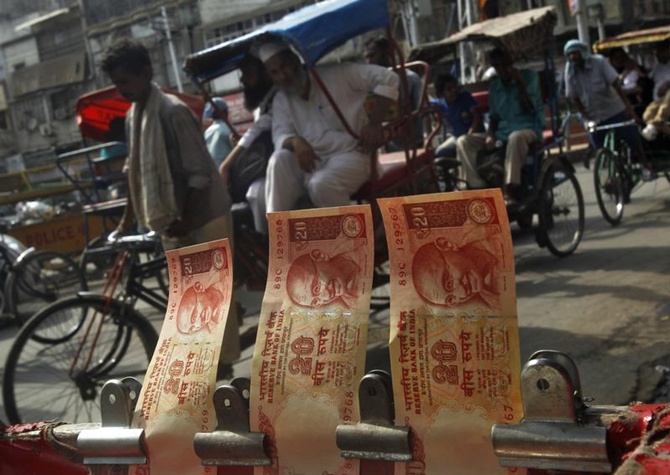Photographs: Reuters Chandan Kishore Kant in Mumbai
Amid high expectations from the Modi-led government, experts do not rule out events when the markets will be disappointed with the government.
U R Bhat, managing director of Dalton Capital Advisors, tells Chandan Kishore Kant that corrections are unavoidable but will come with an upward bias.
The Sensex, he feels, will double in five years and investors should stay invested for the long term.
Edited excerpts:
With a Modi-led government in place, are you turning optimistic on India?
If anybody ever had a chance to do something to revive the economy, it is this government.
They have no excuses, as they have hardly any opposition. They have to deliver. An economy revives only when investments take off. That is where, for five years, we have had serious problems.
This government has the wherewithal to ensure the decisions it takes are enforced without undue delay.
…
'Stay invested, Sensex will double in 5 years'
Image: U R Bhat, managing director of Dalton Capital Advisors (Inset).Photographs: Reuters
Are you in the camp of those who foresee the Sensex at 60,000 in 5 years?
Historically, the Indian market has given a compounded annual return (CAGR) of around 16 per cent on a long-term basis.
Anybody who is saying that in five years the Sensex will go to 60,000 is only saying that in the next five, years the Sensex will generate a CAGR of around 19 per cent.
Given the mandate that the Modi government has and the possibility of some epoch-making changes in the economy, it is entirely possible that the market gives a 19 per cent compounded return over the next five years instead of the 16 per cent it has been generating hitherto.
But the returns would not be smooth, year over year. You will see corrections on the way. The markets might get disappointed with Modi, too, sometime. This could be after the first six or nine months, when there could be a feeling that things are not moving as fast as was expected.
Foreign institutional investor flows could be steady this year because in the emerging market space, most economies are not doing well. China is facing a huge slowdown and most other emerging markets have serious political, currency, inflation and other structural problems.
India, with its hopes resting on the new government, is likely to receive disproportionately large allocations among emerging markets. In many ways, the economy is in a 1991-like situation; this requires a 1991-type budget. Assuming Modi will deliver, investors should not be investing for the next three to six months but for the next five years. If the Sensex does not at least double in the next five years, there is something wrong with us.
…
'Stay invested, Sensex will double in 5 years'
Photographs: Reuters
What should be the top priorities for this government?
First, review all the pending decisions which have been gathering dust in the web of the governmental decision making apparatus. An orderly disentanglement of all the knots we have tied ourselves in, in terms of approval processes, is an imperative for accelerating growth.
The government needs to give time-bound project clearances and ensure the reasonable terms and conditions accompanying such clearances are implemented, with zero tolerance for non-compliance. We need to create new infrastructure and improve the existing infrastructure; these are the enablers of further growth.
For the next 18-24 months, most entrepreneurs will be busy executing their part-completed projects, which will hopefully get a fillip in terms of approvals from the new government.
Hence, there is unlikely to be massive new investments immediately from the private sector. Therefore, it is important for the government to activate the investment engine by implementing some important infrastructure projects on their own.
This will be a clear break from the past, where most projects were being implemented under a public-private partnership (PPP) model. The model has run into serious problems, largely because of the lack of a clear understanding of the role of the government as a partner, as also its role as the regulator and the ultimate boss. Once these roles overlap, the government does not remain only an equal partner.
It is necessary to clearly un-bundle these different roles of the government and allow the PPP project to run as any other business partnership, with the normal dispute resolution process in place. Implementing a national goods and services tax, rationalising of subsidies, providing better governance and energising of public sector undertakings should be the other priorities.
…
'Stay invested, Sensex will double in 5 years'
Photographs: Reuters
Where will the government find money to start investments on its own?
That's not a very big deal. There is no reason why the government should run public sector undertakings in non-strategic areas of business.
In areas like defence and possibly very important infrastructure projects, they need to be present for strategic reasons.
But what's the point in the government being in businesses like construction, engineering, chemicals, metals, transportation, telecom, tourism, trading or even financial services? They must have a blueprint to sell these companies in a transparent manner.
For starters, they need to exit from companies like Axis Bank, Larsen & Toubro and ITC, held through SUUTI.
There is possibly a good case for the sale proceeds of SUUTI's holdings to be paid to the erstwhile unit holders of US-64, who have been shortchanged. In the same vein, there is a need to clear up the Government's holding in Bharat Aluminium and Hindustan Zinc; this, along with SUUTI holdings, should fetch the Government something close to a trillion rupees. Rationalising of subsidies, especially the non-merit ones, should fetch a similar amount at least.
With that, the government can solve quite a few problems. One reason entrepreneurs are concerned about investing in projects is that the government is seen to be frequently bullying them and finding lame excuses to renege on contracts.
There is no way anyone, including the government, should be allowed to get away by not honouring a valid contract.
The government as the ultimate regulator and law maker has to set an example in being transparent and fair in its dealings and not force citizens to approach the courts against it. If the general perception is that the government's decisions are not objective and fair, it is unlikely that it will command the respect of its citizens.
…
'Stay invested, Sensex will double in 5 years'
Photographs: Reuters
What’s your view on oil subsidy?
It is one of the most important subsidies which need to be stopped. It is largely misdirected and goes to people who can pay for it, distorting demand.
The oil subsidy mechanism needs to be completely revamped. The dismantling of these might be best done in one shot.
This window is now open for the present government and can be presented as an inevitability.
Six months later, there will be state elections and a hundred other reasons to delay the revamp.
If handled well, people will most likely accept if prices are market-determined just as the price of potatoes are market-linked.
Can public sector banks (PSBs) make a comeback?
Private sector banks are in a much better position to grow profitably compared to these. PSBs are groping for direction with huge non-performing assets and other stressed assets, inadequate capital resources and continued unreasonable interference by their owners.
With the revival of the growth momentum in the economy, the fortunes of PSBs might turn around in respect of stressed assets.
However, the major factor of adequate capitalisation to satisfy the Basel-III norms will require some serious policy changes that might involve funding of probably around a couple of trillion rupees or a dilution of government holdings below 51 per cent.
Dilution below 51 per cent will require parliamentary approval and providing capital of around Rs 2 trillion is almost impossible, given the state of government finances. State-owned banks do not generate enough internal accrual to capture the growth opportunities in the marketplace.
Their finances have been further crippled by the previous government's demand for high dividend payouts. With their inadequate internal generation, PSBs can probably grow at six to seven per cent annually. If the economy starts taking off and grows at six to seven per cent annually, there is a huge opportunity for banks but that will be captured by private sector banks. They have no problem of capital; they can raise it from the market.
…
'Stay invested, Sensex will double in 5 years'
Photographs: Reuters
How is India Inc positioned to raise capital?
Corporates will start raising equity money and restructure their balance sheets that are hugely leveraged, particularly the infrastructure companies. If they are able to de-leverage, they will have the ability to build new capacities.
The government should encourage long-term investors like insurance and pensions funds to acquire majority holdings in quite a few of these projects which are operational and have reached a steady state, like road and power projects.
This is what happens elsewhere in the world. Insurance companies need 25-30-year assets and these steady-state infra projects are most suited to their needs at reasonable yields.
Once the capital is released by such sales, the project developers will have the ability to implement new projects.
...
'Stay invested, Sensex will double in 5 years'
Photographs: Reuters
Is money making opportunity now history in sectors like information technology (IT), fast moving consumer goods (FMCG) and pharmaceuticals?
IT stocks were quoted at 25-30 times when their growth rate (annual) was 40-50 per cent. Now, their growth rate is in the vicinity of 10-12 per cent.
Any company growing at 10-12 per cent is unlikely to command a valuation of 20-30 times earnings.
The market will probably pay under 10 times earnings for such growth rates. FMCG companies have also taken a back seat.
They had a fantastic run when cyclicals were not doing well. Investors are going to do some sector rotation, since money will migrate to sectors that can generate better returns.
The valuations of FMCG appear stretched and, hence, IT and FMCG might not be the best picks now.









article